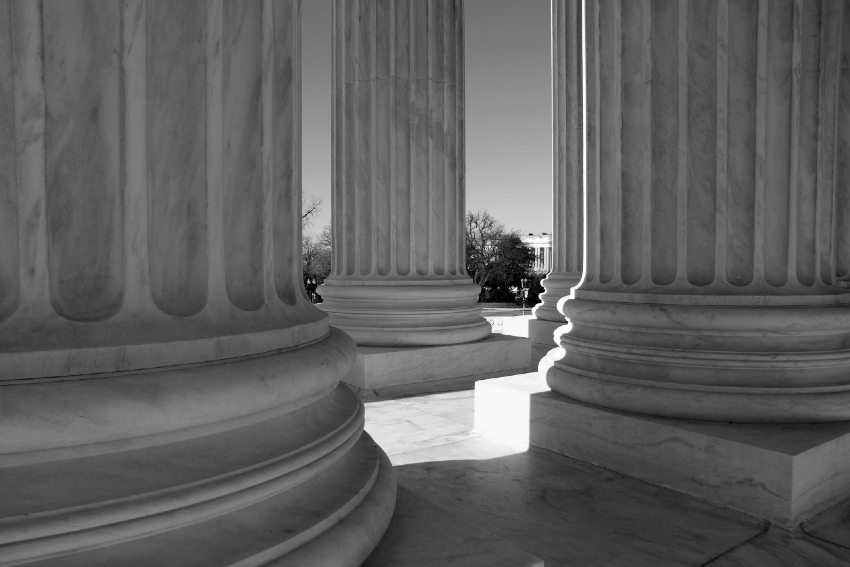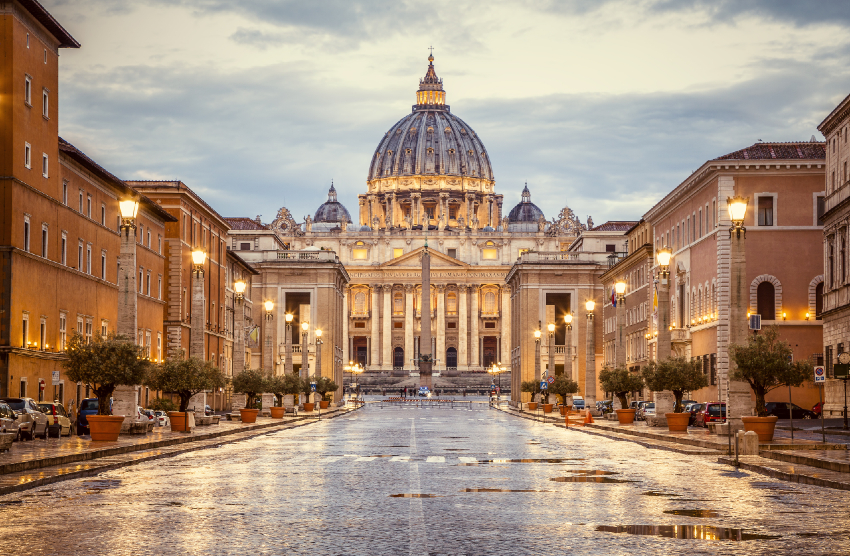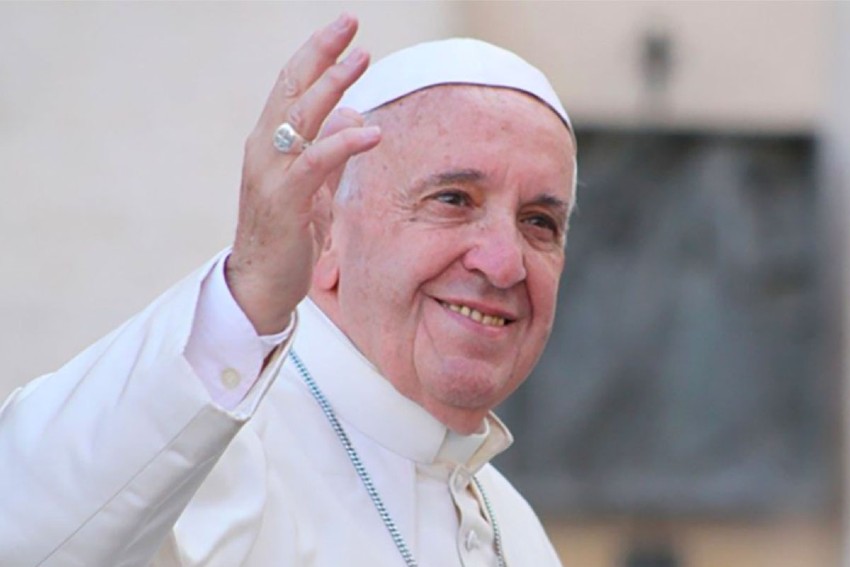
Bishop Athanasius Schneider, 62, in a photo from 2015, eight years ago, when he was 54.
Schneider yesterday, on the Feast of Sts. Peter and Paul (June 29) released a brief but powerful statement on the old Catholic liturgy.
He said, essentially, that not complying with prohibitions of the celebration of the old Mass by Catholic priests and laity was not an act of schism, “provided one continues to recognize the Pope and the bishops and continues to respect them, and pray for them.”
The full text of the statement is below.
Schneider, born Anton Schneider on April 7, 1961, in the then-Soviet Union, is the Auxiliary Bishop of Astana in Kazakhstan (prior to 1991 a republic of the Soviet Union). He is a member of the Canons Regular of the Holy Cross of Coimbra. He is known for championing the pre-Vatican II liturgy. “Noncompliance with the prohibitions of the traditional Mass does not make one, by that fact, schismatic, provided one continues to recognize the Pope and the bishops and continues to respect them, and pray for them.” —Bishop Athanasius Schneider, Paragraph 10, Statement on the old Mass, dated yesterday, June 29, 2023, Feast of Sts. Peter and Paul, released on various websites around the world (for example, here)
***
Letter #107, 2023, Friday, June 30: Bishop Schneider issues a statement on the old liturgy
Today, a new, and perhaps important, development in the “liturgy wars.”
It comes in a letter from Bishop Athanasius Schneider, 62, of Astana, Kazakhstan, concerning the old liturgy.
The statement is a heart-felt appeal for the continued celebration of the old liturgy in the Catholic Church.
It is also, explicitly(!) a call to disobey a liturgical instruction of Pope Francis.
In other words, a call to reject a written papal instruction — while claiming that this is acceptable as long as it is not a rejection of… Pope Francis himself.
Schneider is saying, essentially, that the Pope’s authority is limited in regard to certain Church matters, and, in this case, that his authority does not extend to the prohibition of the celebration of a liturgy which previous Popes defended and promoted for centuries.
Schneider’s argument is that the Pope’s authority, though absolute in the Church, in nevertheless limited by what previous Popes have said and done over 2,000 years.
Schneider’s argument is that the old liturgy in itself is not open to review or repeal by anyone in the Church, even the Pope, because it was used for centuries, by the entire Church, and formed and nourished thousands of saints.
Therefore, it would be (to synthesize) a logical contradiction to prohibit or restrict such a liturgy as something negative or wrong.
Not even the (admitted) supreme authority of the Pope can order such a logical contradiction, Schneider argues.
So Schneider has made an argument that the Pope’s authority has limits, and that one of those limits is in this matter of regulating a liturgy that was regarded as orthodox and holy for centuries.
It is not yet clear, of course, whether others will join with Schneider in making this argument, or whether the Pope and his liturgical advisors will attempt to refute and/or condemn Schneider’s argument.
This remains to be seen.
How it is decided will have much to say about the continuity (or rupture) of teaching in the Church — something which will also have consequences in other areas, for example, in moral teaching.
So what seems to be at stake in this debate is, the fundamental question of “development of doctrine” (development of doctrine is acceptable) and “alteration of doctrine” (alteration of doctrine is not acceptable, according to the entire tradition of Church teaching).
***
But some might argue that prudential reasons dictated this decision, and could dictate other similar decisions, regarding Church teachings and traditions.
The old liturgy was restricted in a July 16, 2021 decision (two years ago now) by Pope Francis.
On that date, Francis issued Traditionis Custodes, saying it was his decision, based on what he was told by his advisors, that the restriction was needed for prudential reasons “to fight the disunity and divisiveness caused by an inappropriate use of the Traditional Latin Mass (TLM).”
(Here is a link to a 2021 article by Msgr Eric Barr which offers four reasons in support of the Pope’s decision.)
The Pope’s document, Barr says, “basically revokes much of Summorum Pontificum“— the document published by the late Pope Benedict XVI on July 7, 2007, in which Benedict said that every Catholic priest would, or should, always have the right to celebrate Mass according to the old rite, because it is a holy and orthodox rite, and so always will have a respected place in the liturgical life of the Church.
So the lines are being drawn.
The lines are being drawn between what some more traditional Catholics see as a papal “over-reach” in this matter, and what the Pope and his advisors say is a necessary measure in order to ensure Church unity in the face of a type of liturgical “divisiveness” which the Pope, it is argued, has the authority to legislate against, even at the cost of seeming to overstep his authority in such a matter.
For this reason, the matter would seem to require some sort of clarification and compromise on an even higher level of reflection and precision than has yet been reached in this debate.
We offer below Schneider’s full text as a contribution to transparency in the Church, in keeping with Pope Francis‘s call to debate all such matters with the courageous freedom which distinguishes the members of the Church.—RM
***
P.S. If you appreciate this letter… would you consider supporting it? Support at the level of even $2.50 per month — a monthly cup of coffee — would support the writing of more letters in the months ahead…. Therefore, consider becoming a “Patron” of this writing! Thanks. (link)
Statement
By Bishop Athanasius Schneider
June 29, 2023
The prohibition of the traditional Latin Mass is an abuse of ecclesiastical power and noncompliance with its prohibition does not in fact constitute disobedience
1. The traditional Roman liturgy of the Mass was the liturgy of our Catholic ancestors. It was the form of the Mass with which most of the European nations (except some Eastern European countries and the Ambrosian and Mozarabic rites), all American nations, and most of the African, Asian, and Oceanian nations were evangelized.
2. “What earlier generations held as sacred, remains sacred and great for us too” (Pope Benedict XVI).
3. “The problem with the new Missal lies in its abandonment of an ever-continuous history, before and after St. Pius V, and in the creation of a thoroughly new book (albeit compiled of old material)” (Cardinal Joseph Ratzinger).
4. The new Missal’s “publication was accompanied by a kind of prohibition of all that came before it, which is unheard-of in the history of ecclesiastical law and liturgy” (Cardinal Joseph Ratzinger).
5. “I can say with certainty, based on my knowledge of the conciliar debates and my repeated reading of the speeches made by the Council Fathers, that this [i.e., the reform as it is now in the new Missal] does not correspond to the intentions of the Second Vatican Council” (Cardinal Joseph Ratzinger).
6. The traditional Roman liturgy of the Mass was the liturgy of all the Latin-rite Saints whom we know at least during the entire last millennium; hence its age is millennial. Although commonly called the “Tridentine” Mass, the exact same form of the Mass was already in use several centuries before the Council of Trent, and that Council asked only to canonize that venerable and doctrinally sure form of the liturgy of the Roman Church.
7. The traditional Roman liturgy of the Mass has the closest affinity with the Eastern rites in bearing witness to the universal and uninterrupted liturgical law of the Church: “In the Roman Missal of Saint Pius V, as in several Eastern liturgies, there are very beautiful prayers through which the priest expresses the most profound sense of humility and reverence before the Sacred Mysteries: they reveal the very substance of the Liturgy” (Pope John Paul II).
8. The Pope and the bishops do not have, therefore, the authority to forbid or to limit such a venerable form of the Holy Mass, which was offered by the Saints for over a thousand years, in the same way as the Pope or the Bishops would not have the authority to forbid or significantly reform the venerable form of the Apostolic or Niceno-Constantinopolitan Creed, precisely because of their venerable, continuous, and millennium-old use.
9. Complying with the abusive prohibition of that venerable form of the Mass of the Saints, issued unfortunately by current churchmen in a time of unprecedented ecclesial crisis, would constitute a false obedience.
10. Noncompliance with the prohibitions of the traditional Mass does not make one, by that fact, schismatic, provided one continues to recognize the Pope and the bishops and continues to respect them, and pray for them.
11. In disobeying formally such an unheard-of prohibition of an inalienable patrimony of the Roman Church, one in fact obeys the Catholic Church of all ages and all the Popes who diligently celebrated and commanded the preservation of that venerable and canonized form of the Mass.
12. The current prohibition of the traditional rite of the Mass is a temporary phenomenon and will cease. The Roman Church is experiencing today a kind of liturgical exile, i.e., the traditional Latin Mass has been exiled from Rome; yet the exile will, for sure, one day come to an end.
13. Since the traditional Latin Mass has been in uninterrupted use for more than a millennium, sanctified by universal reception over time, by the Saints and by the Roman Pontiffs, it belongs to the inalienable patrimony of the Roman Church. Consequently, in the future the Roman Pontiffs will without doubt once again recognize and re-establish the use of that traditional liturgy of the Mass.
14. Future Popes will thank all priests and faithful who, in difficult times, notwithstanding all pressures and false accusations of disobedience, and in a spirit of sincere love for the Church and for the honor of the Holy See, maintained and transmitted the great liturgical treasure of the traditional Mass for future generations.
+ Bishop Athanasius Schneider
June 29, 2023
Feast of Saints Peter and Paul
[End, Bishop Schneider statement on the old Mass]






Facebook Comments